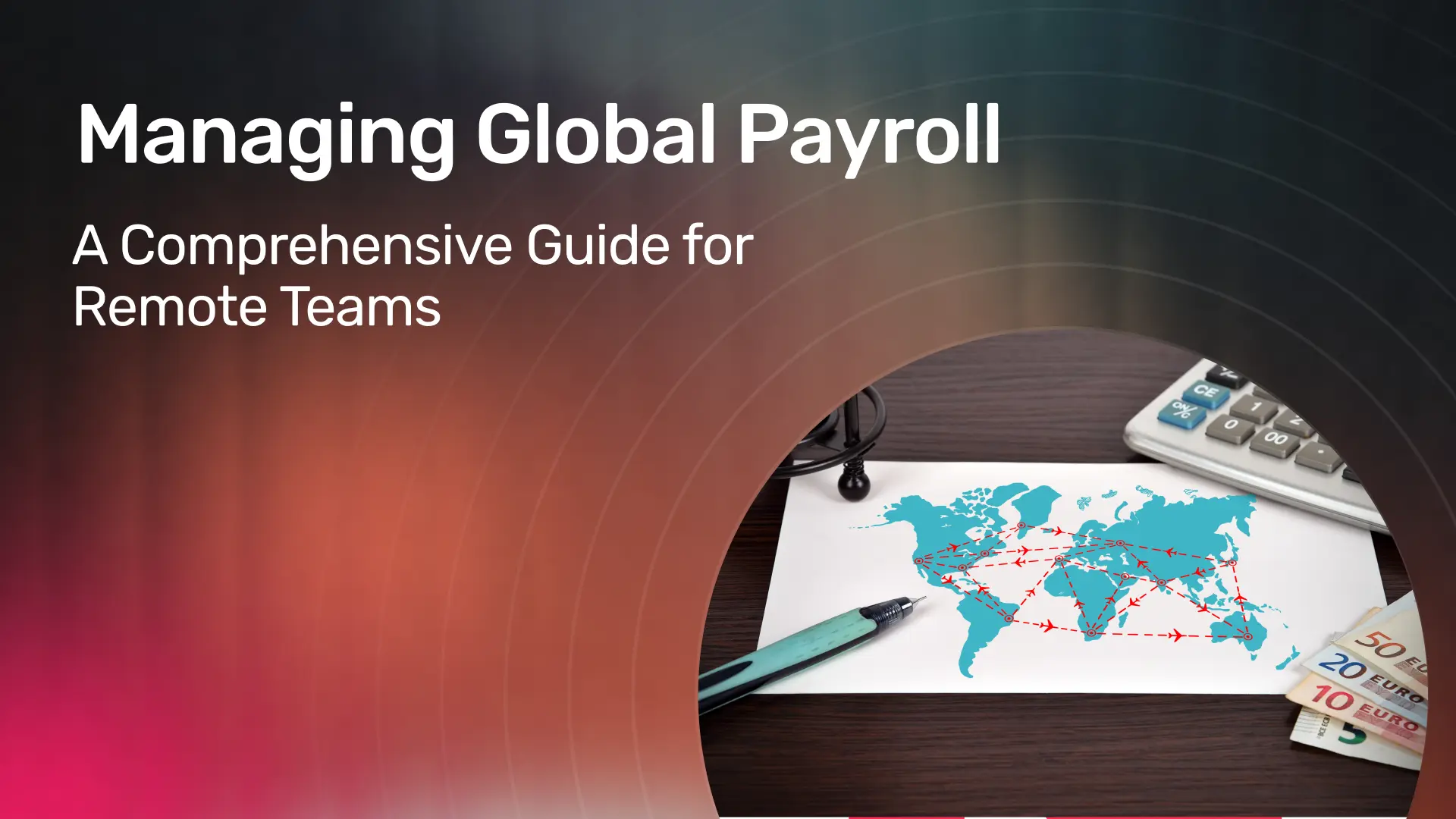Managing Global Payroll: A Comprehensive Guide for Remote Teams
You’ve just paid your employees in Germany but forgot to input the tax code? Miscalculated the amount for the employees' super funds in Australia? These are common occurrences that one encounters when managing global payroll.
But it doesn’t have to be that way. With the right global payroll software, you can eliminate these errors and ensure compliance no matter where your employees are.
This blog will dive into the basics of global payroll, its challenges, and how using an EOR provider can help you run payroll smoothly. Let’s get started!

What is global payroll?
Global payroll includes various processes connected to paying employees across different countries on time. Salary distribution is just one aspect of it — you’ll also need to consider tax withholdings, record-keeping, payslips, and benefits administration. But here’s the kicker: the labour laws that govern these things vary between countries and are often subject to change.
This means that you can easily fail to comply with any of the regulations in each employee’s country and face severe penalties and fines. As a result, your business reputation gets stained, and you might experience high turnover.
Discover the global payroll trends for 2025
Why is good payroll management important?
Good payroll management is crucial if you want your business to stay compliant in new markets. Failing to pay your employees on time often results in disgruntled employees who file HR complaints and leave your organisation. This section will shed light on the importance of having good payroll management.
Cost efficiency
When using lousy payroll software or spreadsheets, your finance teams are in the trenches doing calculations for a long time. Plus, even at the best of times, mistakes can happen. With an automated system, the likelihood of mistakes amounts to zero. This means more money can go toward growing the business instead of fixing payroll errors.
Employee satisfaction
Employees are happier when they get paid correctly and on time. Nothing frustrates employees more than missing or incorrect paychecks. If the payroll mistakes become frequent, your top performers could make their way to your competitors. And it might take you twice as much to hire new talent. When employees can count on getting their money when expected, they trust their employer more. This also creates a positive brand image, attracting high-quality individuals towards your company.
Compliance and risk management
Managing a global payroll requires following different labour laws. Tax laws, labour regulations, and reporting requirements often change. When payroll is managed well, the company follows these rules and avoids fines and legal troubles. Good record-keeping protects the company during audits and helps solve any disputes quickly.

Challenges of global payroll for remote teams
To avoid potential payroll challenges, you must first be aware of the heap of obstacles. Let’s bring your attention to some of the crucial ones.
Managing multiple currencies and payment methods
Running a global payroll means handling various currencies, each with fluctuating exchange rates that can impact compensation costs and planning. When you add banks and payment platforms with unique processing times, fees, and requirements, things get even more complicated.
Some businesses might start working with multiple vendors across different countries. However, the downside is that this creates a fragmented experience and adds significantly to the overall cost of global payroll management.
Following local tax codes and labour laws
When you hire globally, you’ll need to become familiar with the legal landscape of the countries you plan to hire in. This includes learning about minimum wage, required benefits, work hours, taxes, and more.
Another option is to engage tax consultants or seek legal advice, as many countries have different requirements for compliance. Finding such local professionals can be a time-consuming and costly task.
Compliance with local regulations
Typically, companies with remote workers need to register with government agencies in each country. This might mean setting up local business entities or working with local partners. If you decide to go with the legal entity route, your market entry will be stalled for a while.
Consider that you need to obtain a tax number, open physical offices, and register with authorities — all of which will take several months to a year. So, it’s not ideal if you need to hire quickly.
Classification of workers (employees vs. contractors)
The classification between employees and contractors directly impacts tax withholding requirements. With employees, companies typically must withhold income taxes, social security contributions, and other mandatory deductions. For contractors, the tax burden often shifts to the individual.
The consequences of misclassification often include retroactive payment of employment taxes with interest and penalties, provision of backdated benefits and compensation, and legal costs associated with worker disputes.
Data processing across different time zones
When a company operates across continents with time differences of 8-12 hours, the payroll team faces significant timing challenges. They may need to initiate certain processes during non-business hours in the headquarters location to ensure funds are transferred during banking hours in the recipient country.
Last-minute payroll approvals across different time zones can also cause significant delays. For example, if a New York-based payroll processor needs approval from a Tokyo team member, there could be a 13-hour delay.
Data security and confidentiality
Strong security measures like data encryption and malware protection are essential as you send sensitive personal information through multiple systems. Note that most countries have different data privacy laws, so you need various security measures to meet the standards.
For example, the GDPR (General Data Protection Regulation) law applies to EU countries, California has CCPA (California Consumer Privacy Act) regulations, and Singapore uses PDPA (Personal Data Protection Act) to comply with data privacy.

How to manage global payroll efficiently
Here are a few strategies that can help you simplify your payroll operations, reduce compliance risk and create a more efficient process for paying your global workforce.
Use a global payroll provider
Your in-house payroll team might get overwhelmed with the avalanche of work that comes with managing global payroll. Hence, it’s a smart option to outsource payment operations to global payroll providers that specialise in these matters.
By centralising everything on one platform, you’ll have a clear overview of each employee’s salary, taxes, and social security contributions. This will also free up your team’s time for administrative tasks and lower compliance risk. When selecting a provider, look for ones with a strong presence in your target countries and integration capabilities with your existing HR systems.
Employer of Record (EOR) services
Employer of Record services enable businesses to hire in foreign countries without establishing a local entity. The EOR acts as the legal employer of your employees on paper and handles payroll processing, tax withholding, and compliance requirements.
Beyond managing a global payroll, the EOR also takes care of employment contracts, benefits administration, and social security contributions. In that way, you can focus on growing your business while the EOR takes full responsibility for employment liability.
Automate payroll processes
When you use one system for all payroll tasks, your HR and finance teams save time by not having to learn different systems or make them work together. Plus, it’s much easier to onboard employees since their information is stored accurately and quickly.
What’s also great about automation is that any manual tasks can be completed with just a few clicks. This includes scheduling payments, approving payroll inputs, and efficiently logging any changes.
Stay updated on local labour laws
Each country has unique employment regulations that directly impact payroll calculations, including minimum wage requirements, overtime rules, mandatory benefits, and tax withholding obligations. That’s why it’s important to set a systematic approach for monitoring regulatory changes in all countries where you operate.
This might involve partnering with local legal experts, subscribing to regulatory update services, or utilising the advisory services offered by your global payroll provider.
Implement secure payroll systems
Global payroll involves handling sensitive employee data across multiple jurisdictions, making security a critical priority. Consider implementing data encryption, access controls, and authentication measures for all payroll systems.
In addition, it’s crucial that your payroll platforms comply with international data protection regulations, such as GDPR and country-specific privacy laws. You can also train your employees on data handling best practices and perform regular security audits.

Why use an EOR like Native Teams for global payroll?
Native Teams is an excellent EOR solution for managing global payroll on a single platform and paying employees in local currencies — all while maintaining compliance and accuracy. Payroll calculations are automated, including salaries, taxes, and deductions, making the process fast and efficient. Our team of seasoned professionals ensures that you’re aligned with tax and labour laws and provides constant updates regarding any changes.
We’re also GDPR-compliant and implement security measures to ensure the safety of your payroll data. These include, but aren’t limited to, 2-FA authentication, third-party testing, and anti-money laundering policies to comply with global AML standards.
Besides the payroll processing, we also handle the following employment aspects:
- Employment contracts which are crafted with local labour laws in mind
- Employee benefits like private health insurance, pension plans, and wellness options
- Work permits and visa assistance to relocate your employees smoothly without the paperwork hassle
If you want to learn more about our integrated EOR solution that simplifies your global payroll, make sure to get in touch with our experts.
Conclusion
Managing global payroll doesn't have to be a complex challenge that drains your resources and creates compliance risks. By implementing the strategies outlined in this guide, you can transform your global payroll operations from a potential liability into a streamlined function that supports your global growth.
Whether you choose to partner with an EOR like Native Teams or build your own global payroll infrastructure, the key is creating standardised processes that maintain compliance while adapting to local requirements.
